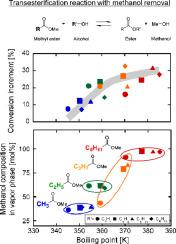Chemical Engineering and Processing: Process Intensification ( IF 3.8 ) Pub Date : 2021-05-01 , DOI: 10.1016/j.cep.2021.108443 Ayumi Ikeda , Wakako Matsuura , Chie Abe , Yasuhisa Hasegawa

|
Zeolite membranes are promising for the assistance of transesterification reactions, but the effects of the reaction conditions have not been fully clarified. In this study, the membrane-assisted transesterification of several methyl esters and alcohols was examined to investigate the influence of the substrates on the conversion and methanol permeation. The conversion of methyl hexanoate was 55.0% without a membrane when reacted with 1-hexanol at 353 K. When the methanol byproduct was removed using an FAU-type zeolite membrane, the conversion increased to 79.6%. A large increase in conversion was also obtained using substrates with long linear alkyl chains. The highest conversion among the 18 transesterification reactions was obtained when methyl hexanoate was reacted with 1-hexanol. These results suggest that the reaction substrates influence the boiling point of the solution and the vapor-phase methanol concentration. Additionally, the effect of temperature and feed concentration on the methanol permeation performance was evaluated for the FAU-type zeolite membrane by pervaporation to discuss their influence on the conversion. Higher reaction temperatures were favorable for membrane-assisted transesterification because more methanol was removed by the membrane. This suggests that controlling the vapor-phase methanol concentration is significant for membrane-assisted transesterification reactions.
中文翻译:

反应底物对膜辅助酯交换反应的影响
沸石膜有望用于酯交换反应的辅助,但是反应条件的影响尚未完全阐明。在这项研究中,检查了几种甲酯和醇的膜辅助酯交换反应,以研究底物对转化率和甲醇渗透的影响。当与1-己醇在353 K下反应时,在没有膜的情况下,己酸甲酯的转化率为55.0%。当使用FAU型沸石膜除去甲醇副产物时,转化率增加至79.6%。使用具有长直链烷基链的底物也获得了转化率的大幅提高。当己酸甲酯与1-己醇反应时,在18个酯交换反应中获得了最高的转化率。这些结果表明反应底物影响溶液的沸点和气相甲醇浓度。另外,通过渗透蒸发评估了温度和进料浓度对FAU型沸石膜甲醇渗透性能的影响,以讨论其对转化率的影响。较高的反应温度有利于膜辅助的酯交换反应,因为更多的甲醇被膜去除了。这表明控制气相甲醇的浓度对于膜辅助的酯交换反应是重要的。通过渗透蒸发评估了温度和进料浓度对FAU型沸石膜甲醇渗透性能的影响,以讨论其对转化率的影响。较高的反应温度有利于膜辅助的酯交换反应,因为更多的甲醇被膜去除了。这表明控制气相甲醇浓度对于膜辅助的酯交换反应是重要的。通过渗透蒸发评估了温度和进料浓度对FAU型沸石膜甲醇渗透性能的影响,以讨论其对转化率的影响。较高的反应温度有利于膜辅助的酯交换反应,因为更多的甲醇被膜去除了。这表明控制气相甲醇浓度对于膜辅助的酯交换反应是重要的。











































 京公网安备 11010802027423号
京公网安备 11010802027423号